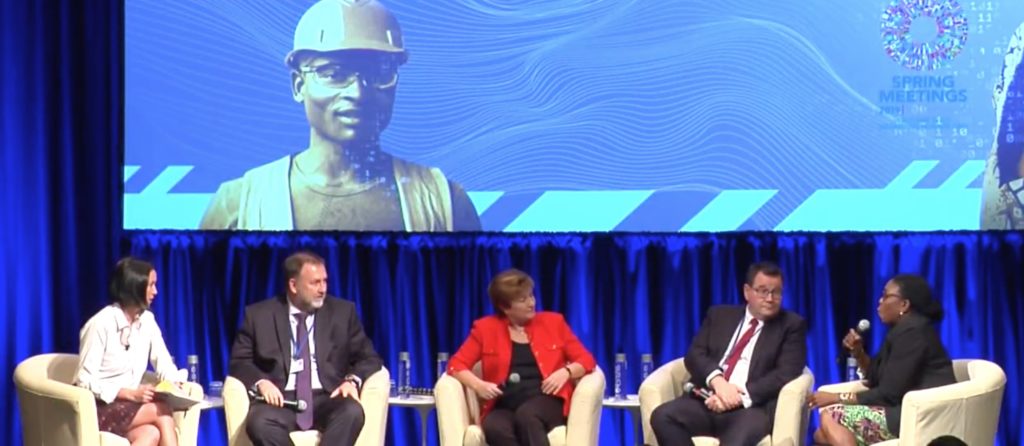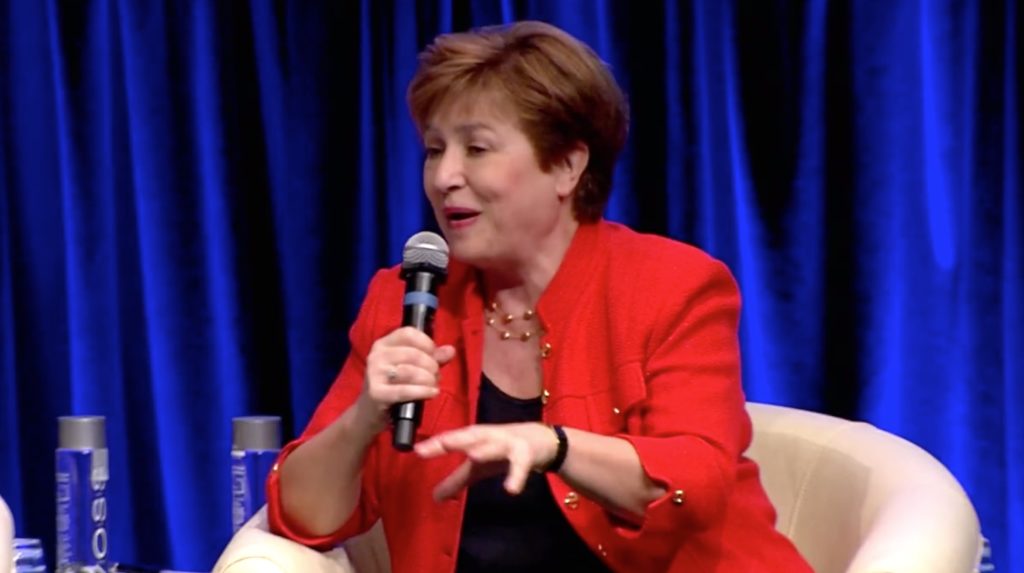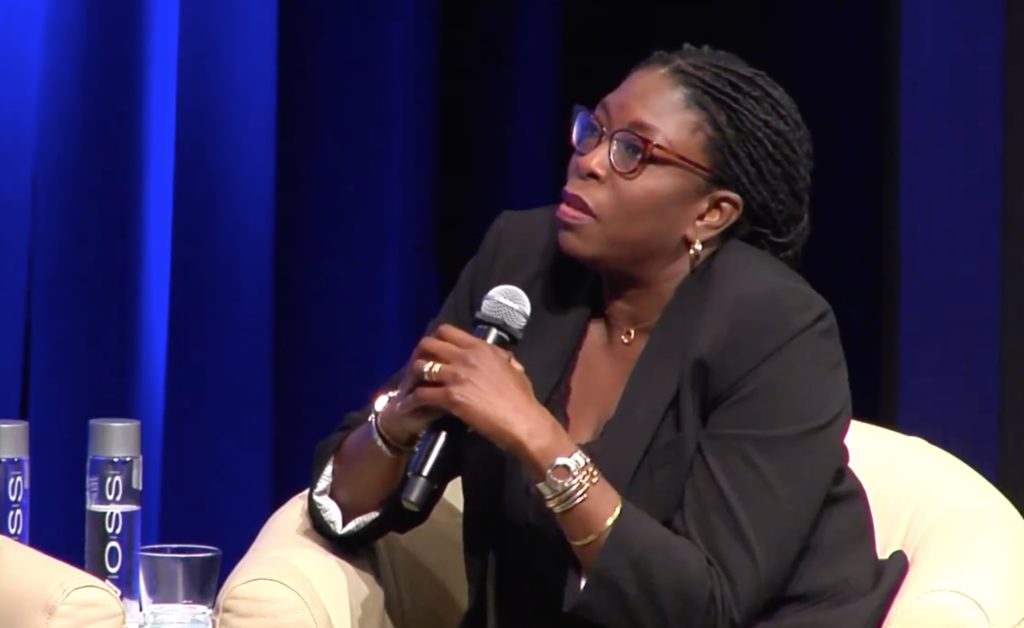
“We know what a difference it makes to be healthy, educated and happy, but how we translate that into finance ministers’ tools is what the World Bank has now roll up its sleeves to help solve.” Kristalina Georgieva
Kemi Osukoya
THE AFRICA BAZAAR MAGAZINE
April 11, 2019
In its continuing efforts to help African nations reach their optimal development goals, the World Bank Group has launched a new strategy for Africa, called Africa Human Capital Plan, that will help invigorate human capital investments in Africa’s people, especially in Africa’s young population.
The goal of the strategy is to enhance African policymakers’ budgetary choices and policy making efforts with the necessary tools they need to bolster investments in education and basic health programs for Africa’s young population in order to ensure this Africa’s demography receive standard development and employable skills needed to compete in the global economy.
According to the World Bank, sub-Saharan Africa has the lowest scores on the World Bank’s Human Capital Index—an assessment of how satisfactory countries invest in the next generation of workforce. The score, which shows high mortality and stunting rates in the region, as well as inadequate student learning outcomes—denotes the direct effect on economic productivity. To help African countries reverse these benchmarks, the World Bank has set a target for the year 2023 for the region to make a massive reduction in child mortality to save 4 million lives, averting stunting among 11 million children, and increasing learning outcomes for girls and boys in school by 20 percent. These achievements can raise Africa’s Human Capital Index score upwards to increase the productivity of future workers by 13 percent, the Bank said.
The World Bank also plan to increase its investments in human capital in Africa by 50 percent in the next funding cycle. This will include new grants and concessional finance for human capital projects in Africa, totaling $15 billion in fiscal years 2021-2023. The World Bank will invest these funds strategically to unlock structural constraints to human capital development. The World Bank will also target game changing interventions that leverage technology and innovation and that prevent and reverse damage to human capital in fragile and conflict-affected settings.

“We have to accept the days we can get one education and one job and then retire happily are over. It’s over,” says Georgieva
Speaking during a panel discussion on human capital at the Spring meetings of the World Bank and International Monetary Fund, World Bank’s Chief Executive Officer Kristalina Georgieva said making investment in human capital is essential to improving a country’s overall development outcome and economic growth. She urged governments to work with private sector stakeholders to ameliorate basic health as well as education outcomes to secure a healthier, better educated people as well as sustain the economy of the country.
“What’s the contribution to GDP growth from having healthier, better educated people?” Ms. Georgieva asked rhetorically. “We know what a difference it makes to be healthy, educated and happy but how we translate that into finance ministers tools is what the Bank has now roll up its sleeves to help solve.”
She underscored it is critically important that countries, especially African countries, invest in human capital regardless of their fiscal budget constraints to make sure their population are not left behind further in the global economy due to the rapidly changing environment of work and how technologies is transforming developed and developing countries.
“We have to accept the days we can get one education and one job and then retire happily are over. It’s over,” stated Ms. Georgieva emphatically. “The world is moving so very rapidly. Just think of how the work environment has changed in these last years and then the notion of skilling and reskilling, that’s [both] the responsibility of the public sector as well as the private sector.”
“People are not asking or requiring of their governments and leaders certain basic things such as reliable electricity, food, drinkable water and sanitation. Imagine if there’s a ground swelling of parents demanding that girls be educated, there will be a response to that.”
Zouera Youssoufou, Chief Executive Officer of Dangote Foundation, who also was on the panel along with Ms. Georgieva concurred with her, stating that African governments will have to make extra sacrifice along with becoming creative with their fiscal budgets to remove the backlog in education, skilling the workforce, family planning, gender equality for girls and boy in order for governments to achieve their goals of boosting investments in human capital.
“It will take sacrifice on the part of the government, also creativity. What I mean by creativity is the fact that you can get support and resources from non traditional places. Typically, the private sector has not invest in [human capital], that just hasn’t happened in our experience. It has always been it’s the government job to provide healthcare and make sure children go to school, but if we can demonstrate, look these kids going to school, and being being healthy is good for the private sector to support because they will have healthy and good employees,” said Ms. Youssoufou.

“I believe the government has to make extra efforts in that sacrifice that we are talking about and then creativity comes in when working with organizations like ours. For example in Nigeria, our foundation is working on how to come up with the extra one percent tax that will be raised by the private sector. That money will be managed by the private sector along side the government to make sure basic health, that we’re aspiring to can actually happen. So it can be done, I recognize it can be very difficult but sacrifice and creativity, I think we can make progress,” she said.
Ms. Youssoufou added that tapping the private sector can also spur ingenuity to help improve workforce development, especially for older youth population or adults with no formal education. While she noted the Nigeria’s burgeoning Nollywood industry as an excellent example of the private sector ingenuity where the industry invented itself and has contributed significantly to Nigeria’s economy– making it the largest economy in Africa. However, she said the public will have to demand human capital investments from their governments and leaders, adding that “people are not asking or requiring of their governments and leaders certain basic things such as reliable electricity, food, drinkable water and sanitation. Imagine if there’s a ground swelling of parents demanding that girls be educated, there will be a response to that.”
On the other hand, she said it’s a matter of perspective. She said the “biggest obstacle to human capital investment is because the payoff is faraway, it’s hard to justify because there’s so many fires that need to be fought immediately.” For example, she said, fragile countries, like those in the Sahel region of Africa, will need to invest in national security and safety instead of education. “The Sahel countries spend over $6 billion on security, that’s money that didn’t go to those issues that we think are so essential, so there’s real pressure of life that these governments face but the biggest is the demand from the people.”
On how lack of investments in human capital has translated globally, Ms. Georgieva also said the rise in populism in societies around the world is a political spillover of discontents from the public due to lack of investment in human capital to help people transition effectively to the current industrial revolution.
“The issue is that people who lost their jobs don’t have the skills to get the new jobs and unless there are active labor policy, we will have more populism. They are political spillover from that problem so that concentration on thinking on how to build human capital but also how to deploy and redeploy. This is something that policymakers have to embrace and not drop the concentration on drivers of growth. We have to recognize that this is one of them and sometimes the most important one,” said Ms. Georgieva.
She added that in places like Africa where the human capital index score is low, electrification and access to internet are a most have to ensure competitiveness.
“One of the most critical factor for Africa to succeed is going to be electrification and connection to the internet because then we can have a massive step up of quality of education. We can have a school in a remote area, provided there’s internet services and electricity, to be connected to schools in other places. We can have teachers to actually teach from one place remotely into many others,” said Ms. Georgieva.
Ms. Georgieva said the World Bank has pledged to invest $25 billion over the next 10 years in internet connectivity in Africa. “We are doing it for many reasons, including to make classroom more virtual rather than just physical. It is possible and shouldn’t be only possible for rich countries it is pressingly important for developing countries to have access to internet so they can catch up.”



